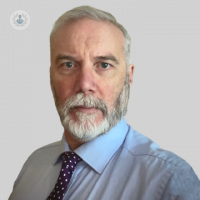What you should know: Skin cancer of the head and neck
Written by:Skin cancer of the head and neck can have a variety of presentations so it is important to seek medical advice if you notice any changes to your skin. In this overview, highly respected consultant oral and maxillofacial surgeon Mr Colin Harrop shares his expert insight on the warning signs of head and neck skin cancer as well as its diagnosis and treatment.

How is head and neck skin cancer defined?
Head and neck skin cancer is an uncontrolled growth of cells arising in the skin or supporting structures (e.g. sweat glands) of the scalp, face or neck. The three most common types in the UK are basal cell carcinoma, squamous cell carcinoma and melanoma. Each has its own particular typical features, and they vary in their level of aggressiveness.
What does skin cancer of the head and neck look like?
Each of the three most common skin cancers which I mentioned previously have their own typical appearance but there may be a degree of overlap between all three. Basal cell carcinomas (BCCs) themselves can be of a number of different types but typically appear as a slowly growing pearly nodule with a central pit or ulcer. They often become crusty and sometimes bleed. In their early stages they can be very innocuous and, as a consequence, often go unnoticed for many months. Although a BCC can cause damage to adjacent skin and structures, it does not spread to other parts of the body
Squamous cell carcinomas (SCCs) also present as nodules and lumps in the skin with ulceration and crusting but typically grow much faster than BCCs, developing over weeks rather than months. Unlike BCCs they can spread to other areas of the body (metastasize) although this is in fact relatively rare.
Malignant melanoma (MM) is a more aggressive skin cancer than the previous two and has a greater risk of metastasizing to other parts of the body. It is usually pigmented (brown or black) but can sometimes be skin coloured. It may show itself as what appears to be a new mole or as an existing mole which changes in appearance. They can also present as a flat pigmented patch on the skin.
How is head and neck skin cancer diagnosed?
If you suspect you have a skin cancer then the first contact is usually your GP who may be able to make a diagnosis. If skin cancer is suspected, your GP will normally refer you to a dermatologist - skin specialists who are very experienced in the diagnosis of skin cancers.
A dermatologist will be able to suggest what may be the best investigation and treatment for your skin cancer. They will also help exclude the large number of non cancerous skin problems for example simple inflammatory spots. The dermatologist may well undertake the treatment themselves. Sometimes, however, if the cancer requires surgical removal and is in a difficult area or requires complex reconstruction, the opinion of a specialist surgeon may be requested.
How is head and neck skin cancer treated?
Treatment of skin cancer can be divided into surgical and non surgical approaches. Examples of non-surgical treatments include ointments such as Efudix and novel treatments like Photodynamic therapy PDT, while surgical treatments include curettage (controlled scraping of the cancer) and wide excision.
As a maxillofacial surgeon I am involved when a surgical wide excision is advised. This involves the surgical removal of a skin cancer with a rim (margin) of surrounding skin. This is often recommended as skin cancers may grow for a short distance beyond what can be seen with the naked eye. Removing a margin of normal looking skin decreases the chances of leaving cancer cells behind.
Once the cancer has been removed the hole in the skin will require reconstruction. This may involve gently pulling the edges of the wound together with stitches. If the wound is large or pulling of the skin would distort important features (lips ,nose etc), a more complex reconstruction may be needed. There are many different techniques, and your surgeon would discuss which would be most appropriate for you.
Can head and neck skin cancer be aggressive?
The majority of skin cancers that present to doctors in the UK are not very aggressive and a well chosen treatment would be expected to be curative in a large proportion of patients.
Some skin cancers do, however, behave in a more aggressive way and can be life threatening, especially if they have spread to other parts of the body. Sometimes other factors mean that a cancer behaves in a more aggressive way, for example, in patients who are taking medication to suppress their immune systems. In these patients, it is often necessary to carry out more in depth investigations prior to treatment, such as scans.
In the large majority of patients, however, treatment of head and neck skin cancer is given with a view to cure.
If you would like to schedule a consultation with Mr Harrop, you can do so by visiting his Top Doctors profile.



